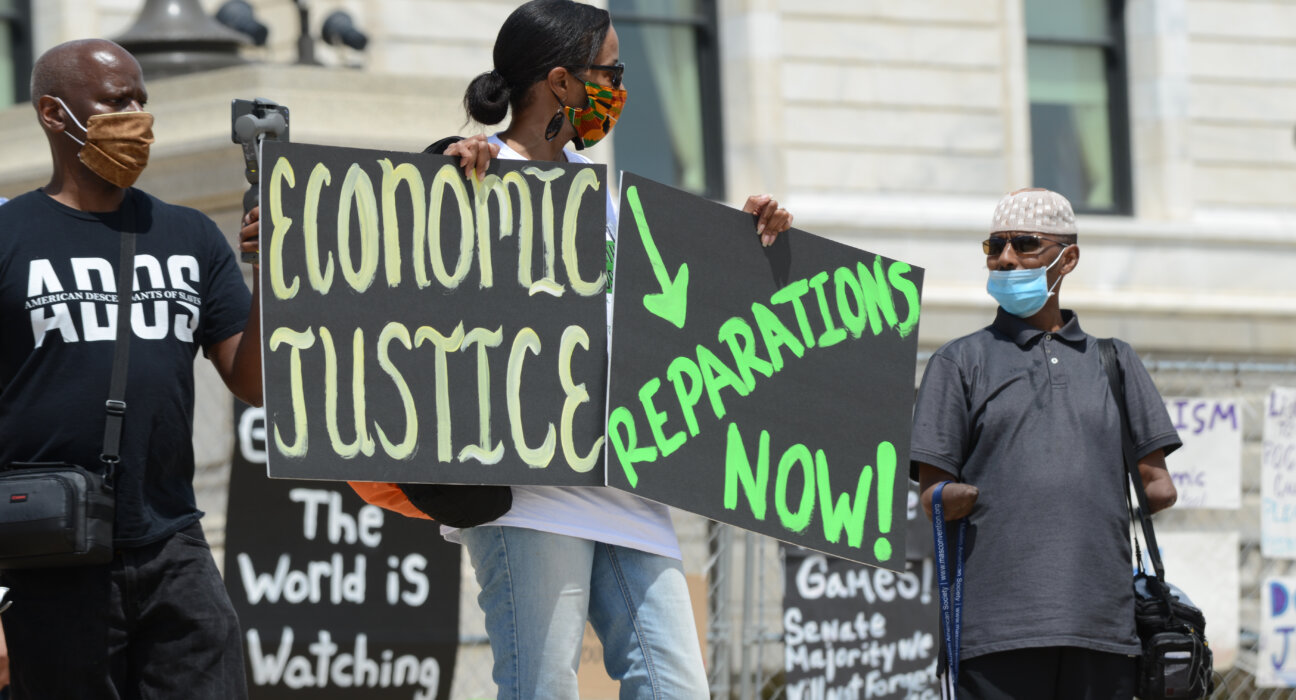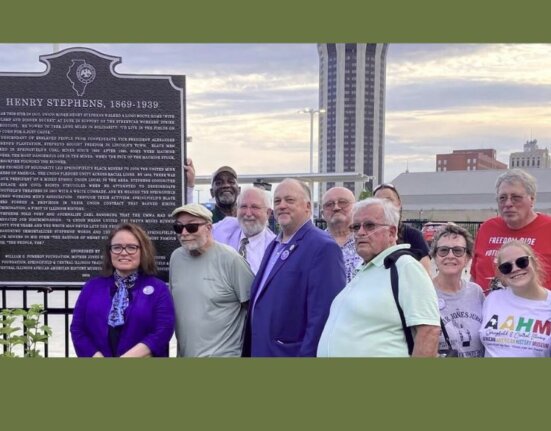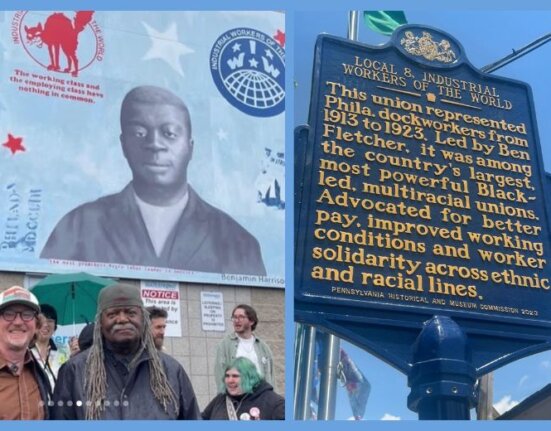New York State and California have both created commissions to study the possibility of reparations to African Americans for the legacy of slavery and post-Civil War segregation and racism. The California commission has already recommended direct payments of over a million dollars to eligible state residents. On the federal level, Senator Cory Booker (D-NJ) and Representative Sheila Jackson Lee (D-TX) introduced legislation in the U.S. Congress to create a Commission to Study and Develop Reparation Proposals for African Americans Act, and Representative Cori Bush (D-MS) is promoting a bill allocating $14 trillion as reparations for the descendants of enslaved Africans. During the 2020 Presidential election campaign, Joseph Biden and Kamala Harris, both endorsed a federal study of reparations.
Debate over reparations for Africans formerly enslaved in the United States and their descendants is not new. In February 1783, Belinda Sutton, who was born in eastern Ghana, kidnapped at the age of twelve, and enslaved in Massachusetts, petitioned in the newly independent Commonwealth’s courts, and was awarded a pension of 15 pounds and 12 shillings from the estate of her former owner, about $4,000 in today’s money.
A March 30, 1844 article in the New-York Daily Tribune (p. 8) reported that a “curious petition” was submitted to the New York State Legislature from Wayne County along Lake Ontario. The petition called on the state to “pay the black citizens of the State for loss of services while in a state of slavery prior to 1827.” The motion was tabled and buried.
On January 16, 1865, Civil War General William T. Sherman issued Special Field Order No. 15. Sherman confiscated coastal land between Charleston, South Carolina and Jacksonville, Florida for redistribution to newly emancipated African Americans. That fall, President Andrew Johnson ordered that the land be returned to the former slaveholders.
On December 18, 1865, during Congressional debate over the Reconstruction acts, Congressman Thaddeus Stevens of Pennsylvania argued that the government had freed “four million slaves without a hut to shelter them or a cent in their pockets. The infernal laws of slavery have prevented them from acquiring an education, understanding the common laws of contract, or of managing the ordinary business of life. This Congress is bound to provide for them until they can take care of themselves. If we do not furnish them with homesteads, and hedge them around with protective laws; if we leave them to the legislation of their late masters, we had better have left them in bondage. If we fail in this great duty now, when we have the power, we shall deserve and receive the execration of history and of all future ages.” Sadly, Stevens was right. The United States failed to provide the homesteads and or implement protective laws and deserves the execration, the curse, of history” (Congressional Globe, 39/1, 1865: 72).
In February 1866, Stevens introduced an amendment to the Freedmen’s Bureau Bill authorizing the distribution of confiscated Confederate land to freedmen, “to each male person who is the head of a family, forty acres; to each adult male, whether the head of a family or not, forty acres; to each widow who is the head of a family, forty acres.” The amendment lost in the House of Representative by a vote of 126 to 37. Stevens introduced the bill again the next year but once again it failed to pass. In the Senate, Charles Sumner of Massachusetts argued that Reconstruction “would be incomplete unless in some way or another we secured to the freedmen a piece of land.”
Between 1890 and U.S. entry into World War I in 1917, there were several proposals that would have provided a federal pension to formerly enslaved Africans. An 1894 Senate bill would have provided formerly enslaved African Americans with a one-time payment of up to $500 plus a small monthly pension. All the pension efforts failed.
In November 1989, Rep. John Conyers introduced House bill HR 3745 to create a $40 billion federal education fund to support Black college and trade school students as a form of restitution for enslavement and racism. Conyers also proposed bills to establish a Congressional Commission to study the impact of slavery on African Americans. Neither bill passed. Conyers unsuccessfully introduced similar bills in each session of Congress until he retired in 2017. In 1994, Florida paid elderly survivors of the 1923 Rosewood Massacre $150,000 each and set up a scholarship fund for their descendants. In 2022, Harvard University created a “Legacy of Slavery” fund to support scholars and students examining the university’s connections to slavery.
Barbados, Jamacia, Martinique, and Ghana are demanding that former colonial powers pay reparations for slavery and colonization. The African World Reparations and Repatriation Truth Commission estimated that Europe owes Africa $777 trillion. Recently, delegates attending a reparations summit in Ghana established a Global Reparation Fund to demand for compensation to African countries for the estimated 13 million Africans kidnapped and enslaved during the trans-Atlantic slave trade. Germany has agreed to pay Namibia $1.3 billion in reparations for crimes committed during the colonial era.
Reparations have been paid in the United States in the past. In 1980, the Supreme Court ordered the United States to pay Sioux tribes $122 million as compensation for the seizure of tribal lands in 1877. In 1988, Congress passed legislation providing eligible Japanese survivors of internment during World War II with $20,000 each.
The primary difference between earlier reparation proposals in the United States and current calls is that earlier demands for reparations for enslavement or injustice would have been paid to the people who were victimized, not their descendants. That was also the case for Japanese survivors of internment camps. The payment to the Sioux was to tribes, not individuals.
I strongly believe the United States should issue a formal apology for the enslavement of Africans and post-Civil War racial discrimination that has kept millions of Black people mired in hopeless poverty. I also believe in taxpayer funded free universal pre-k though college education, that the federal government should guarantee health care and decent housing for all Americans, and government ensured employment for all adults who want to work either in private industry or the public sector. These programs would befit everyone and would address many of the lingering racial disparities in the United States. They can also appeal to Americans across the racial divide.
But for practical and political reasons I oppose pushing for individual or group payments for descendants of enslaved African Americans. I think it is unworkable and would undermine efforts to build a more just society.
The biggest practical issue is who would pay and who would receive payment. One argument for reparations is that whites who are descendants of people who immigrated to the United States after the end of slavery benefited from the racism that prevented Blacks from improving their lives. Blacks were pushed into substandard schools, couldn’t get jobs, and were blocked from purchasing housing that helped white families accrue intergenerational wealth. All of this is true. But all whites did not do well despite racial discrimination against Blacks and many other demographic groups were also victimized by the system, especially Native Americans, but also many immigrants.
According to the 2020 census, about 40% of the population of California identifies at Latino or Hispanic. 35% are white, non-Hispanic, 15% are of Asian descent, 5% and are Black or African American. Another 4% of the population identify as mixed race and less than 1% as Native American or Alaskan Natives. It is hard to justify billing Chinese and Japanese Californians who were victimized by discriminatory laws in the 19th and 20th centuries and Latinx Californians who continue to suffer from discrimination and poverty to pay for reparations to their African American neighbors. In New York State and the United States, the Hispanic or Latino population also outnumbers the African American population.
There are over 5 million American Indians and Alaska Natives, including 300,000 in California, living in the United States today. They were driven off their lands and corralled on reservations by a United States government that made war against them for decades, committed genocidal acts, and forcibly destroyed their cultures. As a result of this treatment, they remain the poorest demographic group in the United States, but they lack the political clout of African Americans. A case could be made that they are the demographic group most deserving of some form of restitution. They did receive an apology buried in a 2009 Defense Appropriations Act for the “many instances of violence, maltreatment, and neglect inflicted on Native Peoples by citizens of the United States.” No funds were attached but there was a clause stating, “Nothing in this section … authorizes or supports any claim against the United States.”
Proposals for reparations for African Americans paid for by Latinx, Asian, and poorer white communities would divide the groups that have traditionally supported the Democratic Party and calls for universal social justice reforms and ensure rightwing Republican control of most states and the national government. According to a Pew Research Center poll, Democrats and Democratic-leaning independents are evenly split on the issue of reparations. 48% of Democratic voters say descendants of enslaved Africans should be repaid in some way, not necessarily through individual payments, and 49% oppose any form of compensation. While three-fourth of Black Americans support some form of reparations for slavery and racism, only 39% of Hispanics, 33% of Asians, and 18% of whites agree.
A Berkeley Institute of Governmental Studies poll released in September 2023 found that while 60% of California voters believe the legacy of slavery continues to affect the state’s African American residents, 59% oppose recommendations by the state Reparation Task Force that California make cash payments to descendants of enslaved Blacks living in the state. 60% of those interviewed said it was “unfair to ask today’s taxpayers to pay for wrongs committed in the past and 53% answered “it’s not fair to single out pone group for reparations when other racial and religious groups have been wronged in the past.” 45% of people who identify as somewhat liberal and 66% of people who identify as moderate oppose the reparations proposal, key voting blocs Democrats could lose if reparations for slavery becomes a major campaign issue in 2024.
As Martin Luther King, Jr. argued in a 1967 addressed to the Southern Christian Leadership Conference, “We must honestly face the fact that the movement must address itself to the question of restructuring the whole of American society.” An alternative strategy that would achieve many of the social justice goals of reparations and would have a better chance of gaining broad based support and being implemented is enactment of universal programs based on the Social Security and Medicare models – everyone pays in and all eligible people benefit from the federal programs. They should include universal health insurance with a possible national health plan; federally funded pre-K through college education with career training options; and housing and job programs that guarantee housing and jobs. I will spell these ideas out in greater detail in a future blog.
Header Photo by Fibonacci Blue from Minnesota, USA, Wikimedia Commons

Alan Singer is a historian and teacher educator at Hofstra University, Hempstead, New York. His most recent book is Class-Conscious Coal Miners: The Emergence of a Working-Class Movement in Central Pennsylvania (SUNY Press, 2024). He can be reached at catajs@hofstra.edu






